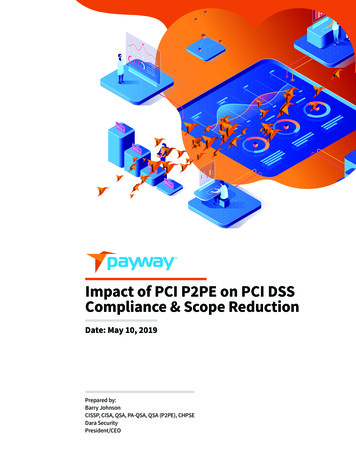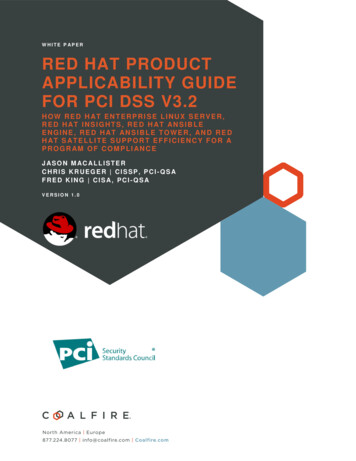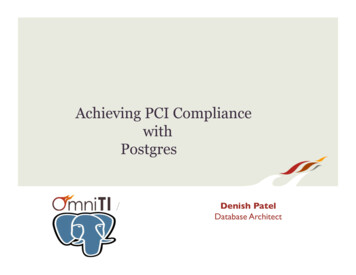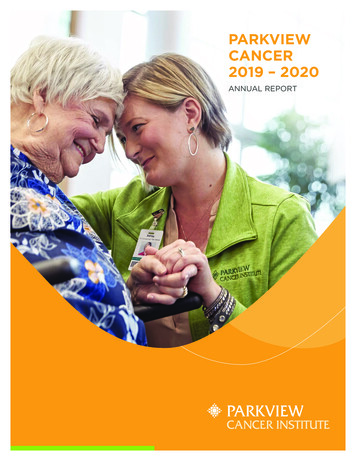
Transcription
PARKVIEWCANCER2019 – 2020ANNUAL REPORT
President’s messageWhen Parkview Cancer Institute opened itsdoors in 2018, we realized a new health caremodel — one that offers cancer experts whoare subspecialized in each type of majorcancer that we treat. Our multidisciplinaryteam of experts is comprised of ParkviewPhysicians Group physicians and practitionerswho encompass medical oncology, surgicalspecialties, palliative oncologists and avariety of other physicians, all of which aresubspecialized in specific types of benignand malignant diseases. Bringing theseexperts together, aligned in a revolutionarymedical model, allows the extensive,individualized diagnosis and treatmentplan each patient deserves.This holistic healing environment withan innovative care model was built to becompletely patient-centric, touching everyaspect of the patient journey from screeningand prevention to diagnosis, staging andtreatment, to survivorship and surveillance.Through it all, our focus on service excellenceand the optimum patient experience remainsthe heartbeat of what distinguishes ParkviewCancer Institute.As you will see in the report, our extensivedegree of multidisciplinary collaboration andpioneering culture has allowed us to recruit thebest fellowship-trained physicians and buildsupport teams focused on providing a superiorpatient experience and outcome.Table of Contents4 Innovation, expertise and unique patient experience6 Advancing cancer treatment through clinical trials7 NanoPac: Pushing the envelope for better pancreatic cancer options10 A new model for cancer care: Multidisciplinary teams of specialists12 Endoscopy fellowship program advances subspecialty14 Tumor Boards focus varied experts on individualizedtreatment plans16 Cutting-edge esophageal cancer treatment means better recovery,less cost18 The concierge team: Keeping the care in cancer care20 Subspecialized care for sarcoma and musculoskeletal tumors24 Innovative sarcoma surgery: Limb-salvage with totalfemur replacement26 Integrative and palliative oncology: Holistic, supportivecare throughout the cancer journey28 Accreditation recognizes advanced breast cancer care30 Delivering exceptional cancer care during the pandemic32 Cancer program quality34 2018 total cancer cases2IPresident’s message
We have the only specialized medicaloncologists, hematologists, palliativeoncologists, gynecologic oncologists,orthopedic oncologists and other uniquespecialists in the region. This group ofexperts practice state-of-the-art medicineand use their expertise to advance scienceand prevent patients and their familiesfrom having to leave the region to get thecare they deserve.We balance the science of research andclinical expertise with comprehensivesupportive services enhanced by ourconcierge team, navigators, palliativeoncology team, social workers and somany others who provide physical,emotional and social support. This isthe “yin and the yang” that is oftenoverlooked in cancer care. It is what I call“complete cancer care.”Despite our milestones and successes,we know that our work is not finished —and we will work tirelessly to continuallyadvance communication, collaboration,support and treatment options to easethe imprint of cancer on our patients.Opening our new building and progressingour focus on complete cancer care allowsus to evolve toward our goal of being thebest regional cancer center in the U.S.“Our focus onservice excellenceand the optimumpatient experienceremain theheartbeat of whatdistinguishesParkview CancerInstitute.”Neil Sharma, MD, PresidentParkview Cancer InstituteIn this report, in addition to our Cancer Program Quality Report, wehighlight achievements, recognitions, key elements and programs withinthe innovative Parkview Cancer Institute clinical model — one that was builtaround compassion, medical expertise and holistic support throughout thepatient journey for complete cancer care.President’s messageI3
Innovation, expertiseand unique patient experienceAt Parkview Cancer Institute, we believe complete cancer care extends far beyond justfighting cancer. From our subspecialized, fellowship-trained physicians, to our unique caremodel, we offer state-of-the-art technologies, comprehensive cancer care and compassionate,personalized attention.4IInnovation, expertise and unique patient experience
AT PARKVIEW CANCER INSTITUTE, PATIENTS CAN EXPECT: Navigation. Patients will be connected to a Parkview Cancer Institute nurse navigatorwithin 24 – 48 hours of referral. This supportive team member answers questions,provides resources and coordinates care. A dedicated nurse navigator follows eachpatient from diagnosis to treatment completion. Access and expedited workup. A comprehensive diagnosis, staging, Tumor Boardreview and personalized multidisciplinary care plan will be completed within threeweeks of each patients’ initial diagnosis. Subspecialized expertise. All of our surgical, medical, radiation and other physiciansare fellowship-trained, subspecialized, and armed with expertise not seen at mostinstitutions. This allows for enhanced knowledge and proficiency not seen withgeneralized surgical, procedural and medical oncologic practices. We believe inproviding unmatched care because every patient deserves to be cared for by expertswho are informed and proficient, helping ensure the best possible outcomes. Multidisciplinary collaboration. Our group of providers of varying specialties arefocused on both cancer and subspecialty care. They work with other sections andservice lines within Parkview Physicians Group and independent groups throughoutthe region. A key aspect of that collaboration is the disease-site Tumor Boards andtumor site team meetings.Tumor Board meetings are individualized and extensive. We review each casefrom history to radiology, surgical procedures and pathological findings, as wellas medical and social issues that may affect treatment. We also discuss currentmedical literature and best practices in terms of each diagnosis. Input is providedby numerous cancer subspecialists and this review allows access to cutting-edgeresearch and clinical trials, when applicable. Tumor Board letter. All patients, their referring physicians and primary care providersreceive a Tumor Board letter, providing a clear summary of their diagnosis, stage andcomprehensive care plan. A simple referral initiates this process. Personalized education. A dedicated nurse navigator will curate and update acustomized education binder for each patient. The educational materials are specificto the treatment plan and individual patient needs throughout every step of thecancer journey.Innovation, expertise and unique patient experienceI5
Advancing cancer treatmentthrough clinical trialsThe Oncology Clinical Research Team at Parkview Cancer Institute actively participates in clinicalresearch studies that bring the most cutting-edge therapies and innovations to our patients.Participation in these clinical trials, which include novel treatment options that are still being testedin patients, sets PCI apart from other community hospitals and provides an additional level of care tocancer patients in our region. At the end of 2018, nearly 60 clinical research studies were available toour patients. Additionally, Parkview Research Center received commendation from the National ClinicalTrials Network for achieving exceptionally high accrual to clinical trials compared to other clinicalresearch sites across the United States.“Cancer research is the key to the advancement of the science which allowsus to better serve our patients and push towards improved outcomes. PCI wasstrategically designed to provide the ideal platform for cancer research in theregion, allowing patients participation in complex clinical trials for which theypreviously may have had to travel long distances. We are committed to creatingthe infrastructure and providing the expertise expected of leading cancerinstitutes in the nation.”Neil Sharma, MD, presidentParkview Cancer Institute6IAdvancing cancer treatment through clinical trials
NanoPac: Pushing the envelopefor better pancreatic cancer optionsThe NanoPac clinical trial is a strong example of Parkview Cancer Institute’s active participation inrevolutionary clinical trials.Pancreatic cancer has a 7 – 9% five-year survival rate despite introduction of additional medications,stereotactic radiation and advances in surgery. Research and advances in multi-disciplinary approachesare desperately needed to make progress towards a cure.Tumor site: Upper GIPrimary investigator: Neil R. Sharma, MDTarget patient population: Patients with locally advanced (nonresectable) pancreatic cancerEnrolling centers: Cedars-Sinai, Baylor University, Texas Tech Medical Center and Parkview HealthTrial stage: NanoPac completed Phase I and Phase II trials at the four sites.“Academic research activity andincreased recognition by oncologysocieties will continue to bringinnovative and cutting-edgeclinical trials in the future, righthere in Fort Wayne.”Takefumi Komiya, MD, Medical OncologistParkview Cancer Institute medical oncologist with extensiveexpertise in research and investigator-initiated trialsSince opening NanoPac at Parkview CancerInstitute in 2018, the PCI research team hasachieved one of the highest national enrollmentrates. In this trial, subjects with locally advancedpancreatic adenocarcinoma receive NanoPac(Sterile Nanoparticulate Paclitaxel) via endoscopicultrasound-guided direct intra-tumoral injection.This study is extremely complex, bringingtogether varied disciplines including GI medicaloncology, interventional endoscopy, HPB surgeryand early-phase research. The InterventionalEndoscopic Oncology and Surgical EndoscopyNanopac Phase I and II trials completed withpromising results for pancreatic cancer.(continued on next page)NanoPac: Pushing the envelope for better pancreatic cancer optionsI7
NanoPac: Pushing the envelopefor better pancreatic cancer options (continued)(IOSE) program, was established at Parkviewin 2013 by Dr. Sharma. IOSE is dedicated tocutting-edge technology, oncology care andadvancing endoscopic and minimally invasivesurgical science, and engagement in research.Due to our nationally recognized expertise andhistory of education and research in advancedinterventional endoscopy, we were able toopen this trial at Parkview Cancer Institute.The ability of the research team to effectivelyexecute this study speaks highly to the levelof sophistication of the PCI research program.Participation in these studies contributes tothe scientific advancement of cancer researchon a global scale and elevates PCI to thehighest echelons of cancer research programs— all while providing a full continuum of themost innovative treatment options for patientsin our region.Lukas Gilmore, PharmD, MBA, BCPSClinical Research Pharmacy SupervisorEmily Powell, PhDResearch Clinical Operations Manager, Oncology8INanoPac: Pushing the envelope for better pancreatic cancer options“To be able to offerParkview Cancer Institutepatient enrollment inNanopac showcasesthe unique expertiseavailable at PCI forpatients with limitedtreatment options. Theavailability of highlytrained and proficientinterventional endoscopyoncology physicianswith access to such atrial is very rare acrossthe United States. Ourenrollment numbersspeak volumes for themany patients we serve.”Michael Mirro, MD,Chief Academic andResearch OfficerParkview Health
Participation in clinical trials requires involvement from patients, research staff and physicianinvestigators. The physician investigators who oversee and are ultimately responsible for all aspectsof the clinical trial, including study conduct and patient safety, are called Principle Investigators. Thenumber of patients enrolled in clinical trials overseen by these Principle Investigators is shown in thechart below. These Principle Investigators are the drivers of the Oncology Research Program at PCI.Primary Research Investigator Activity .Dec.YTDChang, Brian---11-11-1--5Han, Linda11---21-1-118Komiya, Takefumi1-41-52331-222Manges, Robert2-1--1------4Podzielinski, Iwona----31--422315Russell, Wesley------1-----1Sharma, Neil6512129115811111710117Zhang, Richard---2-2-3312-13Total Patients10617161322101522162216To be accredited by the Commission on Cancer as a comprehensive cancer center, a facility must enroll at least 4% of patients inresearch studies. In 2018, Parkview Cancer Institute achieved commendation status with an enrollment percentage of 6%.Research Activity by Tumor Site35Number of Patients302520151050Lower GIHemeGUBreastPatients Receiving Research TreatmentGYNLungUpper GIPost-treatment Research PatientsNanoPac: Pushing the envelope for better pancreatic cancer optionsI9
A new model for cancer care:Multidisciplinary teams of specialistsThe Parkview Cancer Institute’s innovativemedical care model organizes all specialties,providers and services by disease site — lung,breast, gastrointestinal, skin and others. It’s anew approach, one that we saw at some of themost advanced cancer centers we visited whileplanning Parkview Cancer Institute (PCI). As wedesigned our care model, we chose to adopt asimilar site-specific, multidisciplinary approach.Each tumor site team specializes in treating atype or group of cancers. A team may includesurgeons, radiologists, medical oncologists,radiation oncologists, pathologists, registerednurses and other medical providers. At everystep, the tumor site teams collaborate andcoordinate care, so patients spend less timewaiting and can start treatment sooner.This new collaborative model offerssignificant advantages over traditional cancer care: Streamlines the diagnosis, staging and treatment plan for patients Allows for PCI to dedicate attention to often overlooked aspects of cancer care whichcan improve outcomes: diagnosis, staging, supportive care and surveillance/survivorship Allows greater subspecialization by our providers, which promotes proficiency andimproved outcomes Gives patients an optimal experience Organizes implementation of supportive services Improves multidisciplinary communication; specialists learn from each other Facilitates downstream tracking of patient data10IA new model for cancer care: Multidisciplinary teams of specialists
“Neil Sharma, MDChair, Upper GI Care TeamTumor Site TeamDivision ChairsAt every step, the tumorsite teams coordinate care,so patients spend less timewaiting and treatment canstart sooner.”Neil Sharma, MDIwona Podzielinski, MDChair, Gynecologic Care TeamSarah Wang, MDChair, Lung Care TeamHead and Neck Care TeamRichard Zhang, MDChair, Genitourinary Care TeamChristopher Johnson, DOChair, Sarcoma andMusculoskeletal Tumor Care TeamLinda Han, MDChair, Breast Care TeamDara Spearman, MDChair, Skin Care TeamSean Garrean, MDChair, Lower GI Care TeamJeff Letzer, DOChair, Hematology Care TeamTumor site team division chairsI11
Endoscopy fellowship programadvances subspecialtyWith a growing need for care in the field ofendoscopy, PCI developed the Center forInterventional Endoscopic Oncology & SurgicalEndoscopy (IOSE), led by its director, NeilSharma, MD.This advanced endoscopy fellowship programis a tertiary graduate medical education (GME)training ground, designed for physicianspursuing additional training in a wide rangeof endoscopic procedures, from commongastrointestinal disorders and diseases tounusual and difficult-to-manage clinical cases.The program participates in the national matchand the application for this limited and uniquefellowship is highly competitive, drawingnational attention to Parkview Health.IOSE is unique, as a tertiary care referralprogram with an academic approach in apatient- and community-centered setting (asopposed to an academic teaching hospital).The program’s goal is to train future leadersin endoscopy, advancing the field throughinnovative clinical care, research and teaching.“After practicing in Gastroenterologyfor a few years, I often had a feelingthat my training was not complete,and something was missing. I had theamazing opportunity to complete ayear of fellowship training in AdvancedInterventional Endoscopy here atParkview Health from July 2019 June 2020. This not only allowedme to learn what I felt was “missing”but also taught me more than Icould imagine, from how to performadvanced endoscopic procedures inbenign pathology to the complex andinteresting field of GastrointestinalOncology, including cancer preventionin high-risk patients, to diagnosis,treatment and management ofdiseases in different stages.After working in other states, I cansay that the care given to patients atParkview Health is outstanding. I am”truly honored and blessed to be partof this team, and to be able to providecare to our patientsSaurabh Gupta, MD, Neil Sharma, MD, Chetan Mittal, MD12IEndoscopy fellowship program advances subspecialtyMariajose Rojas DeLeon, MD
Tumor site teammetricsParkview Cancer Institute (PCI) has developed tumor siteteam metrics to help monitor and decrease the amountof time patients have to wait prior to the development oftheir treatment plan and give them, as well as their otherproviders, a clear definition of their specific cancer andhow clinically severe the cancer is. We also aim to ensurethat every patient is connected to and has access to thenavigation program and supportive services offered byParkview Cancer Institute.The speed and transparency that PCI offersdifferentiates us from other community hospitals —and even academic centers.The metrics were designed to set the highest standardsand expectations to ensure that PCI upholds andenhances the expectations of providing a personalizedpatient journey, quality and safety, and growth.The metrics in this area include: The time between when a patient receives acancer diagnosis at an office visit and the time amultidisciplinary review of the case is completedat site-specific Tumor Board. The Tumor Board letter includes TNM or diseasespecific stage. The Tumor Board letter includes category stage(Stage I-IV). Provider places referral to Navigation on or beforethe day the cancer diagnosis office visit.Diagnosis visit to Tumor Boardwith Tumor Board Letter within 3 weeks97.8%0%100%Tumor Board Letter includes TNMor disease specific stage98.8%0%100%Tumor Board Letter includes category stage/group I - IV98.3%0%100%Provider referral to navigation prior toor on the day of the diagnosis visit92.6%0%100%Navigation contact within 48 hoursof provider/patient diagnosis visit98.1%0%100%Navigator discussed and provided patientwith education binder99.4%For 2020, PCI has asked the tumor site teams towork towards a goal to update the clinical, posttreatment, and pathological cancer stages into theEMR as patients move through their cancer carejourney. This will facilitate improved downstreamanalytics and allow us to better implementinterventions, track quality and clinical outcomes,and recruit to research studies in the future.Our commitment to quality is reflected inupholding the expectations of the metrics.Neil Sharma, MD, presidentParkview Cancer Institute0%100%Navigator discussed and provided patientwith care pathways99.1%0%100%Navigator discussed and provided patientwith Tumor Board Letter97.3%0%100%Tumor site team metricsI13
Tumor Boards focus varied expertson individualized treatment plansTumor Boards, composed of specialists from different surgical and procedural specialties, are keycomponents of Parkview Cancer Institute’s unique model of care. With this multidisciplinary approach,each patient benefits from an entire team of experts focused on his or her case.Every week, nine site-specific PCI Tumor Boards meet to discuss cancer cases and share knowledge.In this multidisciplinary team effort, practitioners collaborate to determine the best possible cancertreatment and care plan that considers the case-specific needs of each patient.Discussions at Tumor Board meetings areindividualized and extensive. We reviewa patient’s history and go over radiology,surgical and pathological findings, as wellas medical and social issues that wouldaffect treatment. We also discuss currentmedical literature, best practices andany available clinical trials for which thepatient may be eligible.PCI boasts subspecialized physicians in fields typically only seen at large national institutions oracademic centers. For instance, our care teams include subspecialists in gynecologic oncology,interventional endoscopic oncology, dermatology and orthopedic oncology. Tumor Board meetingsalso serve to provide education to other participating providers and team members, elevating theoverall level of care provided throughout our care teams. To round out the review, supportive careproviders such as genetic counselors and social workers may also participate in tumor board meetings.Once the Tumor Board agrees upon treatment recommendations, the findings are summarized in awritten letter that includes a synopsis of the tests performed, clinical diagnosis and proposed treatmentplan. The letter, which is discussed with patients by their dedicated nurse navigator, serves as a keycomponent of a customized education binder curated specifically for each individual patient.What’s different about PCI’s approach? It’s the level of transparency — patients are invited into theconversation and made an integral part of treatment decisions. By sharing what we know, we helppatients better understand their choices and take a more active role in their own care.14ITumor Boards focus varied experts on individualized treatment plans
Tumor BoardscheduleBREASTLinda Han, MD, chair, Breast Care Team Every Friday, noon – 1 p.m.LOWER GI/RECTALSean Garrean, MDchair, Lower GI Care Team Every Friday, 7 – 8:30 a.m.GUZhentao Zhang, MDchair, Genitourinary Care Team Every Wednesday, 7 – 8 a.m.GYNIwona Podzielinski, MDchair, Gynecologic Care TeamLUNGSarah Wang, MD, chair, Lung Care Team Every Tuesday, 7 – 8 a.m.MELANOMADara Spearman, MD, chair, Skin Care Team Every Monday, noon – 1 p.m. Every Monday, 7 – 8 a.m.HEAD AND NECKSarah Wang, MDchair, Head and Neck Care TeamSARCOMAChristopher Johnson, DOchair, Orthopedic Care Team Every Monday, noon – 1 p.m. Every Tuesday, 7 – 8 a.m.HEMATOLOGYJeff Letzer, DOchair, Hematology Care Team Every Wednesday, noon – 1 p.m.UPPER GINeil Sharma, MD, chair, Upper GI Care Team Every Thursday, 7 – 8:30 a.m.** General Tumor Board Meeting occurs everyThursday from 7 – 8:30 a.m.Tumor Boards focus varied experts on individualized treatment plansI15
Cutting-edgeesophageal cancertreatment meansbetter recovery,less costSteve Kriszt (middle) with family.After a history of Barrett’s esophagus, a precancerous condition that does not result inesophageal cancer in most patients, SteveKriszt was told that he did in fact haveesophageal cancer.A resident of Traverse City, Michigan, Mr.Kriszt first sought treatment in his homestate. After reviewing his case, the initialrecommended treatment plan included anesophagectomy — an open surgery to removethe esophagus. This surgical option includesremoving the diseased part of the esophagusand top part of the stomach. The stomach isthen pulled up into the chest and reattachedto the remaining esophagus.Such an invasive surgical procedurewould require a week stay in the hospital,a temporary feeding tube and result inunavoidable, long-term gastrointestinal issues.To avoid the morbidity of this life-alteringsurgery, in addition to the quoted 200,000cost, Mr. Krizst decided to look for othertreatment options.Mr. Kriszt’s search led him to Jeremy Barber,MD, an interventional endoscopist at SpectrumHealth. Dr. Barber believed the patientwould be a good candidate for EndsocopicSubmucosal Dissection (ESD). This advanced,less invasive surgical procedure would spare16Ithe esophagus. His case was reviewed bytheir oncology team who agreed with thisassessment. Once Dr. Barber saw the size ofthe tumor and determined the complexity ofthe surgery, he reached out to Neil Sharma,MD, interventional endoscopist, ParkviewCancer Institute, for consult.Dr. Sharma, an interventional endoscopist,founded the Interventional EndoscopicOncology & Surgical Endoscopy Program,a collaboration between Parkview CancerInstitute, gastroenterology and surgicalspecialties, in 2013. His experience andconcentrated focus on endoscopic procedureshas allowed him to perform over 100 ESDsurgeries for cancer and become a nationallyrecognized key opinion leader in the surgery.Advances in technology and knowledge ofoncology have allowed less invasive surgeryincluding robotic and endoscopic techniques.Early gastric and esophageal cancers (StageI) can have minimally invasive surgery wherethe organ is dissected from the inside out viaa technique called ESD. The cancer is removeden bloc (in one piece) with negative margins(termed “Ro”) and fits curative criteria perNational Comprehensive Cancer Network(NCCN) guidelines while sparing cost andmorbidity of traditional surgery.Cutting-edge esophageal cancer treatment means better recovery, less cost
“Dr. Sharma went to bat for me through the insurance issuesand everything. It wouldn’t have happened if not for hispersistence. I was able to get a nearly 40,000 surgerypaid in full by my insurance because he fought for me. I trulycouldn’t have done it without him.”Steven Krizst, patientMr. Kriszt was scheduled for surgery at ParkviewRegional Medical Center only to be informedby his insurance company that they would notapprove this out-of-network surgery. Dr. Sharmaand his team again intervened, personallyworking with the insurance company to ensurethe surgery was approved. The following day,surgery was completed using the new surgicaltechnique and he was discharged 23 hours later.Endsocopic SubmucosalDissection (ESD)By implementing this new technique, the patientwas spared a significant amount of recoverytime, discomfort and financial strain. He wasable to keep his esophagus intact and also avoidchemotherapy and radiation.EsophagectomyCutting-edge esophageal cancer treatment means better recovery, less costI17
The concierge team:Keeping the care in cancer careIntegral to the Parkview Cancer Institutevision to build the region’s best cancerprogram is deep commitment to thepatient experience. That commitment isclearly evident through our visionary caremodel, but it stems from recognizing thatevery patient is different; every family isunique. At PCI, we have built a culturefocused on addressing individual needs,one patient and one family at a time.Cancer is a diagnosis fraught with anxietyof the unknown. By having the rightpeople in the right roles communicatingand responding to the ever-changingneeds throughout a patient’s cancerjourney, we hope to ease the ease anxietyof the unknown by providing resources,education and friendly, comforting“advocates. Our vision requires that wecontinuously work to integrate initiativesand team members focused on ourpatients’ needs, from the moment theycome through our doors.The concierge team, unique to PCI’s caremodel, is focused on hospitality and isdesigned to help make the treatmentexperience more personal and welcoming.Upon arrival, patients and their familiesare approached and greeted warmlyby a concierge. We know that formany individuals, this may be their firstexperience with Parkview — or even theirfirst exposure to Fort Wayne — and thisteam sets the tone not only for our cancercenter, but for some, northeast Indianaas a whole. That’s a lot of responsibilityThe most important trait we lookfor in our team is empathy. Eachconcierge is a friendly face at thebeginning and end of each visit— someone who knows patients’names, their stories and personifiesthe warmth and caring of what weextend at PCI.”Fayth HainesConcierge Services ManagerParkview Cancer Institute18IThe concierge team: Keeping the care in cancer careMembers of the Parkview Cancer Institute concierge teamfill a unique, patient-centric support role within the care model.
for this team of five, which is why therecruitment and selection process is sostringent for these vital positions.Far more than a greeter, a conciergecan help reduce stress, especially fornew patients. A cancer diagnosis can befrightening, so these unique team membershelp put patients at ease with a friendlywelcome, a steaming cup of coffee, a hugof encouragement — whatever they sense apatient may need or want when they walkinto the building. The concierge doesn’t justpoint the way to where patients need to gowithin the facility; he or she accompanieseach patient to the appropriate examinationarea, infusion bay or consultation room.The team forges personal relationships withpatients and their families. They step upwhen someone may be having a bad day, orwhen they want to celebrate. They noticewhen a patient needs to talk, or when theyprefer to keep to themselves. This kind ofemotional intelligence takes compassion,attentiveness and an abundance ofempathy. They personify the warmth andcaring that we extend at PCI.This unique and empathetic role is justone of the many ways that PCI wraps itsarms around our patients. We believe thatcomplete cancer care means addressingevery possible aspect of patient care —including emotional and other supportiveneeds. By focusing on patients and theirfamilies as people with psychosocial needsbeyond their disease, we can providecomfort to our patients in unexpected ways.The concierge program exemplifies thatprinciple for Parkview Cancer Institute.“At Parkview CancerInstitute, we focus oncomplete cancer care.That means taking careof every aspect — thephysical, emotional andother supportive needs.Our unique vision hasbeen embodied by thisteam and highlightsthe core principals ofParkview Cancer Institute.”Scott JamesChief Operating OfficerParkview Cancer InstituteThe concierge team: Keeping the care in cancer careI19
Subspecialized care forsarcoma and musculoskeletal tum
When Parkview Cancer Institute opened its doors in 2018, we realized a new health care . best regional cancer center in the U.S. President's message I 3. . Russell, Wesley - - - - - - 1 - - - - - 1 Sharma, Neil 6 5 12 12 9 11 5 8 11 11 17 10 117 Zhang, Richard - - - 2 - 2 - 3 3 1 2 - 13 Total Patients 10 6 17 16 13 22 10 15 22 16 22 16 .
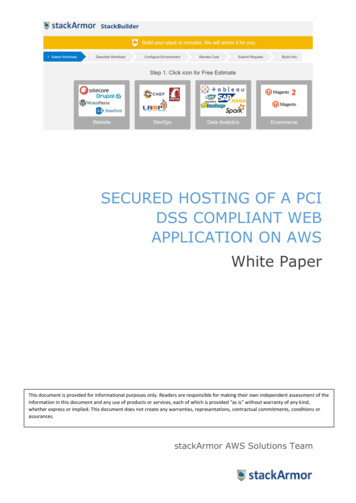
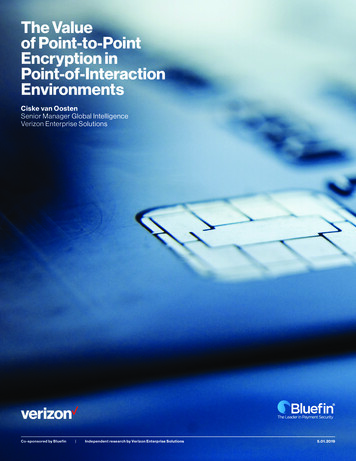

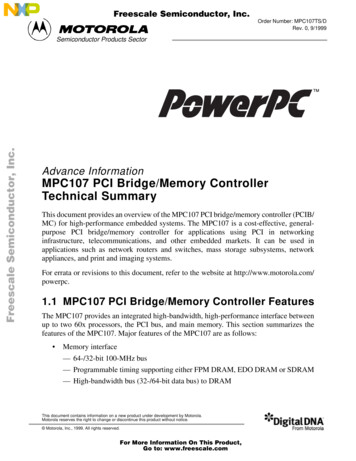
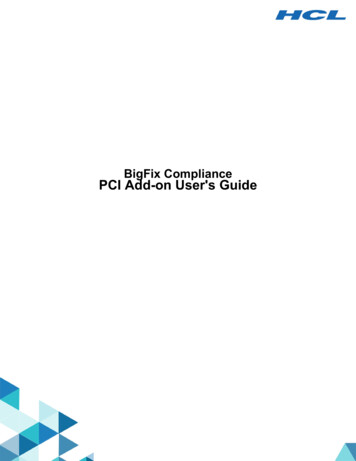
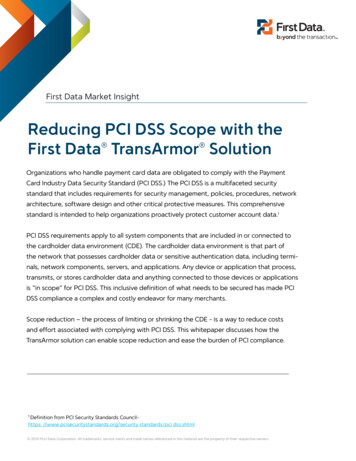
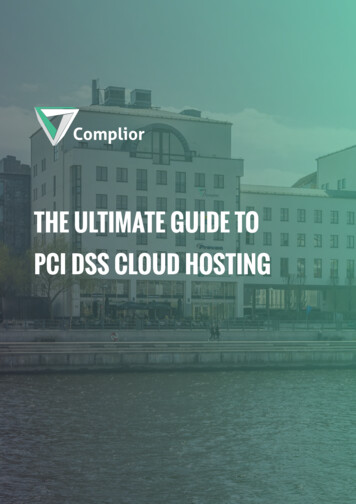
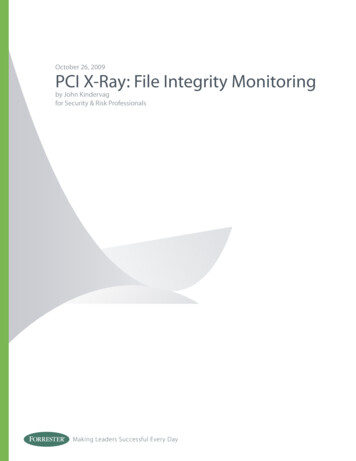
![PCI Compliant - but are we secure -- FOR PRINTING IN GRAYSCALE [Read-Only]](/img/14/303-pci-3.jpg)
